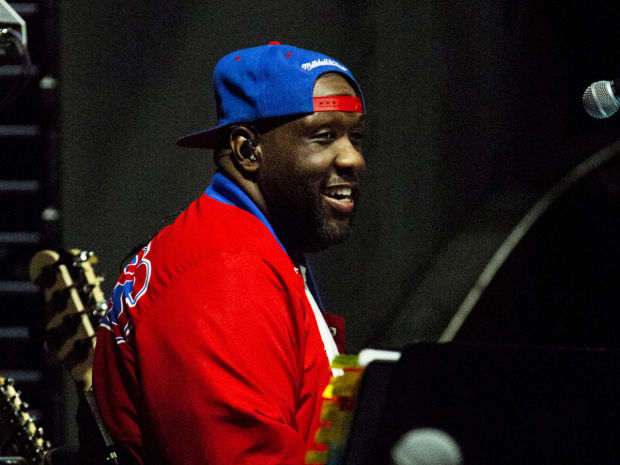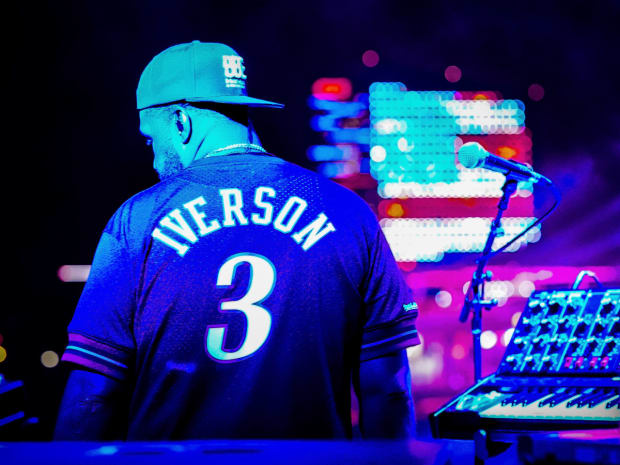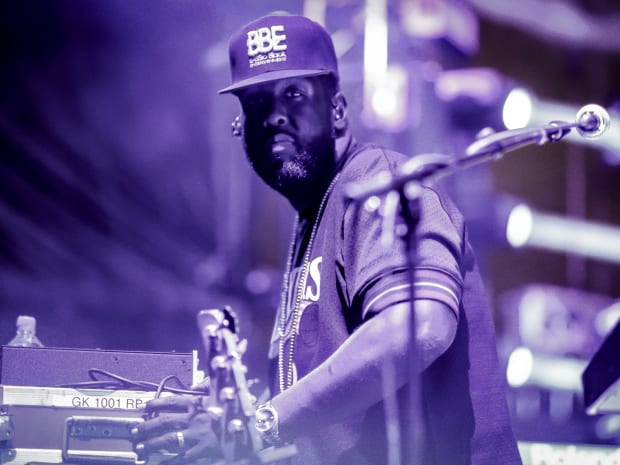Adam Blackstone Spotlights HBCU Music Groups at NBA All-Star Game
NBA All-Star Game musical director Adam Blackstone previews the performers and performances for Sunday night's game
Adam Blackstone will play a key role in bringing the 2021 NBA All-Star Game to life. As the league’s musical director for the weekend, Blackstone, who has worked with artists like Alicia Keys, Cardi B and Justin Timberlake as well as for events like the Super Bowl, Grammys and Oscars, is entrusted with working with the various performers to balance their creative and musical visions and to develop a smooth run of show.
In the lead-up to Sunday's game in Atlanta, which will be played in front of a limited group of spectators, Blackstone teamed-up with various HBCU musical groups, including the Grambling State University Tiger Marching Band and Florida A&M University Marching 100, to weave their identities into the broadcast. For the game’s player introductions, the FAMU band will be backing Team LeBron while the Grambling State band will be playing as Team Durant gets called out. The bands themselves were pre-taped, though, Blackstone will be in a production truck on Sunday during the intros, cueing the recordings in real-time to adjust to player reactions in the moment.
“The NBA and musicians, and music in general, has had a great marriage for a very long time,” says Blackstone, who has played a role in nearly ever NBA All-Star Game since 2010 and has been the league’s official All-Star Game musical director since 2017. “I love that our game is one of the things that always allows the music and the basketball to be at the forefront at the same time.”
Furthering a commitment to HBCU performing arts groups, the Clark Atlanta University Philharmonic Society Choir is slated to perform an original rendition of “Lift Every Voice and Sing” and step teams from Spelman College and Morehouse College will also be featured throughout Sunday’s telecast. Blackstone, who is teaching a composition and songwriting class at Morehouse this spring, is looking forward to showcasing both the tradition—and talent— of the various schools.
In the lead-up to the All-Star Game, which will see more than $3 million donated in initial support of HBCUs and communities of color impacted by COVID-19, Blackstone spoke with Sports Illustrated about what it was like working with the marching bands, what we can expect to see and hear on Sunday night and the NBA’s partnership with HBCUs for this year’s game.
The following conversation has been edited for length and clarity

Sports Illustrated: What’s the biggest challenge you had to deal with for this year’s event?
Adam Blackstone: One of the biggest challenges was that when you pre-record music you have a timestamp. What I mean by that is, let’s just say I do five minutes of live music, when we had an audience if Kobe or Dwyane Wade or LeBron got a longer applause than others, then on the fly I had to make a decision to say we’re going to loop these eight bars because the announcements are still going.
I take that same mentality when it comes to incorporating the marching bands for this weekend. Something just as little as some of the players getting hurt before the game and now being replaced by other players will add time to everybody we announce. I might need another 20 seconds of music so I’m going to have to loop eight bars and say let’s get the announcer to go over these eight bars. Because technically I had not recorded that, so now I’m going to make it seem like I’m producing it live on the spot as if we were all together. So that would be one of the challenges of a gig like this, to say we’re going off of a feeling, but the music is already recorded.
SI: How do you go about acting on that feeling?
AB: The music is actually recorded, but I’m making it loop, making it flow, making it feel live on the spot by cueing different sections while the announcer and teams and the starters and the reserves and the coaches are being announced.
SI: You mentioned the HBCUs, what was it like working with the marching bands in particular?
AB: We’ve been on a bunch of calls and the HBCU band culture is a whole other phenomenon. They’ve evolved from playing just football games and basketball games to having their own competitions, whether that be drum line competitions or band competitions or formation competitions, and so I have been so involved in making sure we carry on that tradition this weekend—to give the crowds of people watching on television a great show and to help the players get hype.
I picked a bunch of songs with them and I was able to say, “Give me your top five Atlanta records that are recognizable.” We’re not coming in this year with a specific artist so you don’t hear a lyric. So one of my jobs was to say, “What are the melodic songs, that when you hear the melody and don’t hear the lyric, you know what it is and still gets you hype.”

SI: Do you have any more specifics on what we should expect?
AB: I think just expect to have a really good, entertaining party. For anybody that hasn’t experienced the HBCU culture, especially at a basketball game, you’re gonna have fun, you’re gonna be up on your feet in your living rooms, you’re going to be able to dance and be able to hopefully sing along with some of the horn lines and drum line melodies. And we want the players to have fun as well.
I hear LeBron talk about it all the time, that no matter how many All-Star Games he’s done, it’s always an honor to get that call and be considered one of the top players in your conference. What I want to do, in a musical sense, is show gratitude and show thankfulness to those players who give us this entertaining sport and continue to uplift us in our culture and in our communities. If I can provide the soundtrack to that for this weekend then so be it. I’ve done my job if everybody is happy and having a good time.
SI: Sticking with the topic of the HBCU involvement, what message do you think involving the HBCUs like the league is doing this weekend sends more broadly?
AB: To me it means a lot. We can’t take for granted how long the NBA has been around and we also can’t take for granted the segregation before it was called the National Basketball Association. It was a segregated sport. We have a lot of work to do in our world, don’t get me wrong, but we have come full circle to now we are encouraging, just by the look of the court, by the sound with this music and just by an openness to attend Historically Black Colleges and Universities through a platform like All-Star Weekend is huge. I also think that it’s going to open the door for a lot of student-athletes that may be a little bit torn that they didn’t get into Kentucky or Duke, Kansas or North Carolina and maybe they end up going to Howard or maybe they end up going to Morehouse and playing ball. And just to know that in this moment the NBA has an eye on them is a big, big deal. It gives hope to men and women all over our country to say, “No matter what I’m doing and what school I’m at, eyes are on us so we should always do our best.”
SI: And you personally have also taken to teaching at Morehouse this semester, correct?
AB: Right. And so what we do by highlighting these HBCUs, and especially what I teach, is that you don’t have to play an instrument or shoot a ball to be in the NBA. For what I do, I get to be on the floor for the All-Star Game and it has nothing, technically, to do with basketball itself. I’m thankful I get to bring awareness and bring that light, to say, “Hey, every camera operator is at the NBA All-Star Game, every technician, a sound person, they’re at the NBA All-Star Game.” Education really outweighs everything and I do think this year plays a special role by highlighting HBCUs and highlighting the fact that school is a big part of culture. School should be a big part of our successes. It is not corny to be educated. It is actually very, very fly to be smart. We look at somebody like LeBron James, who may not have gone to college but continues to be a student and learns, and he keeps giving people a higher viewpoint of where we go after a sport like basketball.

SI: You’ve certainly been involved at a lot of All-Star weekends, but what is your favorite on-court aspect?
AB: That’s very, very easy. I would have to say slam dunk. I have been a part of going to the Slam Dunk Contest live since 2016. I remember Paul George when he just came in. I remember seeing last year with Aaron Gordon, seeing Zach LaVine take off. I remember Victor Oladipo in New York. It has been a dream come true of mine since I was watching Vince Carter on my parent’s couch in 2000 and now to be a part of going to All-Star Saturday night. And now, with it being at halftime this year, I’m really looking forward to it.
SI: So who do you think will win it this year?
AB: I gotta go with [Knicks rookie Obi Toppin.] He has the youthfulness to do some creative things and he dunks with power.